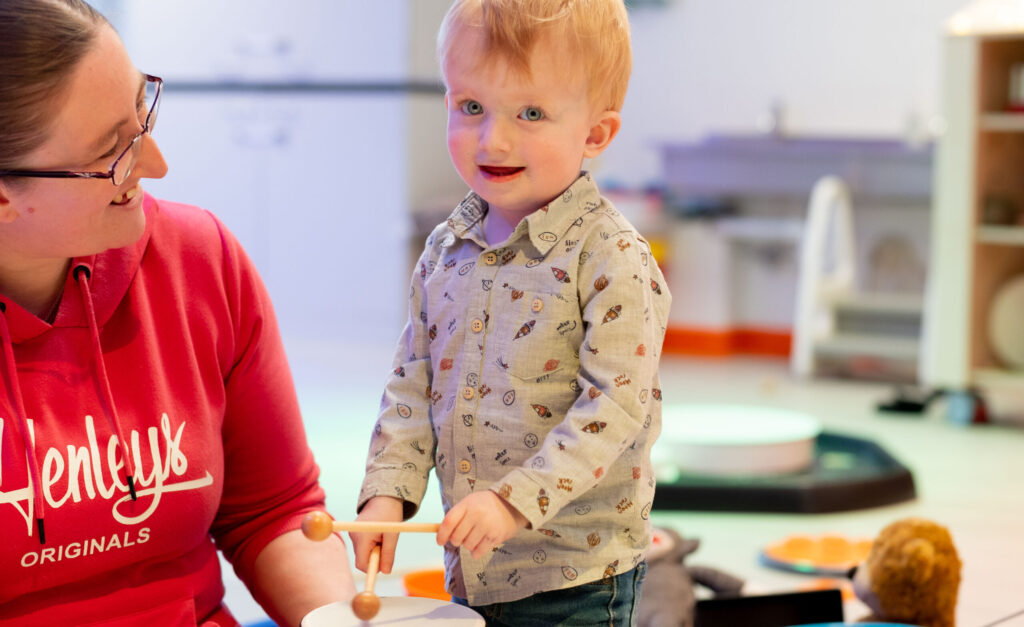Four things you shouldn’t say to a parent of a disabled child
Karla is mum to Alfie, a happy and sociable little boy with complex needs. Alfie is on the pathway to being diagnosed with autism and sensory processing disorder. He also has pica, which means he eats non-foods, and uses a walker to get around. He loves attending play sessions at Sense Hub Loughborough.
In this blog, Karla tells us about the judgemental comments that have been difficult for her to hear when she’s taken Alfie to mainstream play settings.

As a parent of a child with complex needs, it’s so hard to attend groups where you feel judged on your parenting skills.
These days, I only take Alfie to disability-friendly places like the Sense Hub. They are so supportive, they welcome Alfie for who he is, and they share joy in his achievements.
But in the past, the comments I’ve received from other parents and professionals have contributed to my mental health suffering.
People have questioned whether Alfie’s needs are real, and whether I’m doing the right things for him. It’s so hard for me to hear this, because I already find it hard to believe in myself, and to know that I’m doing the best I can for Alfie.
These are some examples of some things that people have said to me about Alfie, and why you shouldn’t say them to a parent of a child with complex needs.
“Alfie is just attention-seeking and naughty.”
I’ve heard this a lot when I’ve tried to take Alfie to mainstream groups, even when I’ve clarified that he’s on the pathway to being diagnosed with autism.
I’ve been in the supermarket with Alfie when he’s having a sensory overload meltdown, and people have told me that he’s being naughty.
“These phrases are upsetting, hurtful and also quite damaging to hear as a parent. They make you question your parenting skills and your own knowledge of your child.”
Even family members have told me to ignore Alfie’s behaviour so that he “gets over it”.
These phrases are upsetting, hurtful and also quite damaging to hear as a parent. They make you question your parenting skills and your own knowledge of your child.
“Alfie will walk when he wants to. He doesn’t need a walker.”
Alfie uses a walking frame when he’s outdoors for support and safety. It was given to him by his physiotherapist.
At a baby group I attended when Alfie was just learning to find his feet at around 20 months, I was told, “He could walk if he wanted to, he’s just being lazy. He doesn’t need a walker.”
This was shattering to hear as a parent: that someone thinks of my child as just being lazy!
Alfie has hypotonia, which means he has low muscle tone, which makes everyday tasks harder for him. He gets tired easily. Every step takes more energy from him than it does from most other people.
So no, Alfie isn’t lazy. His motivation and determination has got him walking!
“Alfie doesn’t have eating problems, he’s just a fussy eater.”
Alfie has always had eating issues. He’s been admitted to hospital so that he could be fed through a tube a few times. He also has pica, and some gastrointestinal issues and trouble with chewing and swallowing.
Even so, I’ve been told lots of times that he’s “just a fussy eater”.
“Parents of disabled children have a hard enough time dealing with daily life, without having to deal with comments from people who just don’t understand.”
Some parents have commented this to me after they saw Alfie munching on cereal during a messy play session. Dry cereal is in fact one of Alfie’s safe foods, so of course he would happily munch on it.
As his mum, I know that Alfie doesn’t like to put certain textures in his mouth, so I know what he can and can’t eat.
Comments like these make me totally question myself and my abilities as a parent. It hurts that people think Alfie is choosing to refuse food that he could be enjoying.
“You’re being paranoid. There’s nothing wrong with Alfie.”
Once, I took Alfie to a soft play centre. At the time, he couldn’t sit unaided, and was happily laying on his back watching others.
A parent came up to chat and asked me, “Why isn’t he playing like his twin sister?” I explained about Alfie’s hypotonia and global developmental delay.
Her response was to take Alfie in her arms and try to stand him up, whilst telling me “there’s nothing wrong with him, don’t be so paranoid. You just need to push him more.”
I was so shocked I couldn’t even speak. I took Alfie off her and I walked away fighting back tears.
I questioned myself: was I holding my baby back? Was I actually imagining it all? Could the doctors be wrong?
But that parent was the one who was wrong. As parents, we know our own children best. I wouldn’t say my child had difficulties if he really didn’t.
Parents of disabled children have a hard enough time dealing with daily life, without having to deal with comments from people who just don’t understand.
When people do take their time to listen and understand, the difference it can make is huge.
Come and see us in Loughborough
We offer support for children and adults with complex disabilities at our new Sense Hub in Loughborough.

